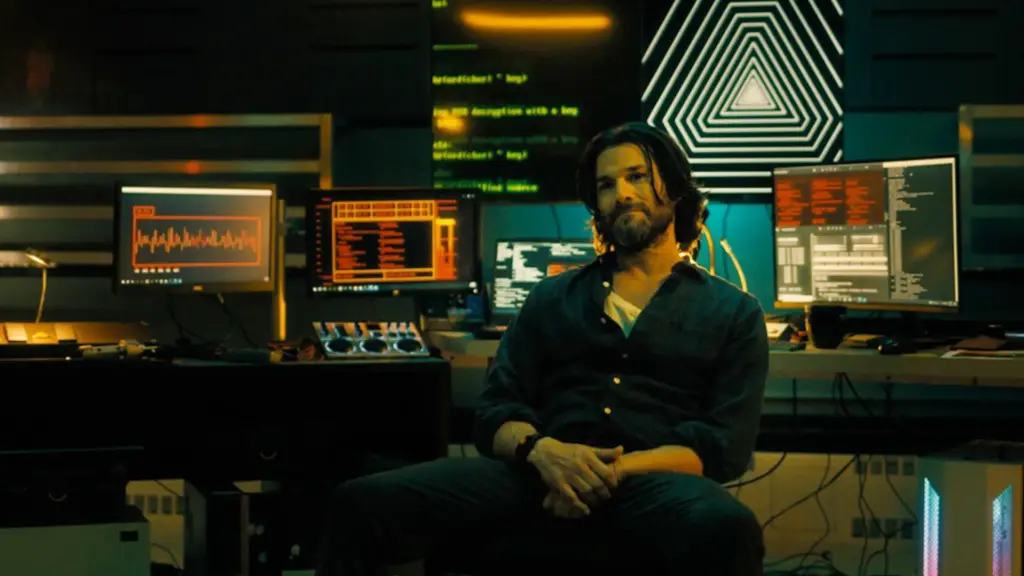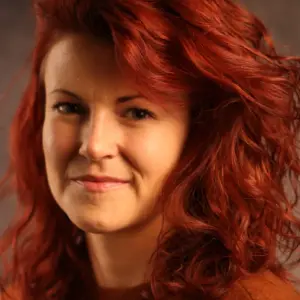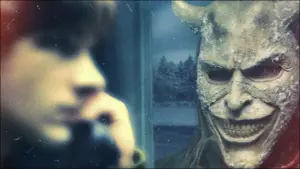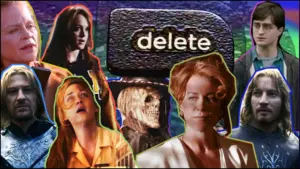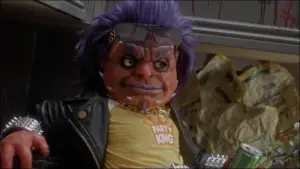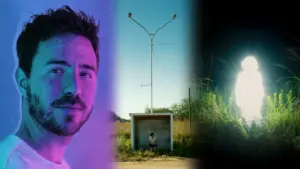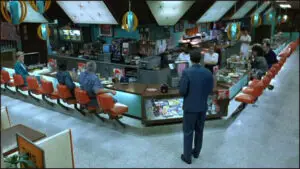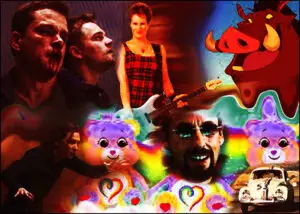Initially making his name on the scene as a Sundance Film Festival winner for his brilliant 2016 short film The Procedure, director Calvin Lee Reeder is back with his first feature-length project in a little over a decade, aptly titled The A-Frame.
Starring Johnny Whitworth (Empire Records, The 100) and Dana Namerode (Adam the First, What Josiah Saw), Reeder’s latest follows a recently diagnosed cancer patient as she seeks treatment for her affliction. Faced with the dilemma of changing her body forever so that her soul may survive, a light appears at the end of the tunnel when a charismatic quantum physicist offers her an experimental procedure that would allow her to ward off her infestation while at the same time remaining wholly intact. What at first appears to be a godsend morphs into her worst nightmare, as the scientist’s alternative methods give way to surreal, Cronenbergian solutions far worse than any treatment under legitimate medical care.
I was fortunate enough to catch up with director Reeder at the Tribeca Film Festival, on behalf of Screenopolis, where he made his world premiere over the weekend. Together, we discussed his long-awaited follow-up to The Rambler, the benefits of telling an earthbound science fiction story, the idea of time being its own dimension, his decision to cast real cancer survivors in his group meeting scenes, working with composer David Wingo, and how creating a vacuum in which a narcissist can play god can shed light on the ethics of technology and morality.
Kalyn Corrigan: You’ve mentioned in the past that you have an affinity for smaller stories. You’ve kept very busy with a plethora of short films over the last decade, but you’re very picky about your projects. I’m curious, in your eyes, what is so special about this story that it made you feel like it was worthy of pursuing in feature length fashion?
Calvin Lee Reeder: I’d always wanted to make a feature that had sort of homemade science fiction elements where an antagonist preferably had a machine that was way too powerful for him to understand. It was definitely a theme we explored in my previous film, The Rambler, and other things as well. So it’d been percolating for a minute. And then one day it just came together and I thought of it like this.
Many science fiction films that take place either in outer space or happen to be films about getting to outer space. How does your story benefit from being an Earth-based science fiction story?
Those are the kinds of things I find most inspiring. I just love strange things happening where they ought not to. You know, space is cool, but strange things are supposed to happen there. So I like the contrast of having an unreal thing happen in like a prime reality.
How does creating a vacuum in which a narcissist can play god help you explore the ethics of technology and morality?
Just a guy with too much power in the way he preys on people. He makes them come alone because he says it’ll benefit them both, and to a degree it does, but to a degree it doesn’t. So he’s manipulative, finding people basically in their darkest hour and gives them an offer they can’t refuse. The Bastion bargain, if you will – and you can’t do that in a crowd. You have to create the conditions where you can manipulate it. That’s what makes him very scary to me.
Normally, you have a unique style of storytelling. It’s very fluid, like you want to leave things up to interpretation as opposed to infantilizing audiences by spoon-feeding them the nitty gritty of the plot points. What made you want to take a more traditional approach to the narrative this time around?
Because I had done those, sort of like Odyssey films that do explore the surreal. I had done that a couple times with The Oregonian and The Rambler. I thought, you know, now that I’m taking another step into the features, I should try to tell a more realistic story, if I can call it that. I don’t know if I can call it realistic, but a more circular narrative that maybe mirrors some other genre films I enjoyed. I wanted to see if I could do it, and I think I wanted an audience to see if I could do it as well.
That makes sense. Are you happy with the results?
I am happy with the results. I’ve got a little bit of highway blind to it. You know, I’ve been working on it for a minute now. So I am happy with it. I just, honestly, I’m a little numb. That’s all.
I thought it was such an intriguing idea to cast real cancer survivors to play the survivors in the group meeting scenes. What led to that decision?
It was wildly opportunistic of us to do that. That’s not necessarily what we planned, but when we got to Kentucky and we talked to our casting director, we were looking at all these different extras and she was like, hey, a lot of these people are cancer survivors. They’re reaching out because they’re responding to the material. And then we were like, hey, that’s a really good idea. Let’s get them all in here and let them tell our story with us. So that was what was behind it. I wish I could say that it was something a little more out or less opportunistic, but it was when the opportunity was there we knew we wanted to do that.
Do you feel like that shed light on anything like did it impact the story that you were trying to tell at all?
I don’t know. I know that I like the texture that it brings. I know that I see something in their faces. I liked that they enjoyed the experience. I spoke to each of them, and some of them would come to set on other days they weren’t shooting, and it was great. They were very supportive. If anything, I think it helped me give confidence, give myself confidence that we were handling the situation as correctly as I could, you know.
Johnny Whitworth is a hugely accomplished actor, but I don’t think we’ve seen anything quite like this from him before. I mean, how much fun is it to write for that character?
It was really fun. We knew we needed someone interesting to play that role, and preferably someone who, like you said, you haven’t seen do it a lot. It’s interesting because he has this swagger, and a scientist should have swagger. I just haven’t quite seen it like that, and we were very pleased with what he was doing. So, it was just like a lot of encouraging him to keep going where he saw it. I’m really glad we did.
The tone of this project seems like a balancing act. I mean, you’re dealing with the heavy subject matter of a life-threatening disease, but there are moments where I laughed out loud, too. Do you have to just hope that you’re weaving the humor into the absurdity in a way that translates for the audience?
Yeah, I have to hope for that. I do not know if everybody will find it funny. I think it’s funny. I don’t know that I would classify it as a comedy. I saw that it was kind of billed that way, but there are a lot of laughs in there. The folks in my life who struggle with cancer are all very funny, so it gave me confidence in going in that direction. You know, using humor as a weapon, if you can strike the balance between the dark and the humorous, is sort of an instinctual thing for me. I feel like I’ve been playing with it for a while, and I guess I do like the way it came.
I find personally that when I try to think of my favorite comedic moments in films, it’s usually in a horror film or a drama or something darker, where there’s a moment of levity that just makes me cackle.
Awesome. Yeah, same. When you kind of get sucker punched by a joke, I think it’s a great opportunity.
You’ve got composer David Wingo on this, who’s worked on so many incredible scores, including Midnight Special, Take Shelter, Barry, Atlanta, and even the upcoming Bikeriders. How did you collaborate with him to create such an eerie, foreboding sense of dread through this truly haunting score?
David Wingo is one of my best friends, and he lives down the street from me. We have a lot of musical connectivity, and it was not hard to find a common language. We like the same stuff and we talk about it all the time. When I hang out with David Wingo, we almost never even talk about movies. We talk about music. So, because he’s a musician and he’s an encyclopedia for film as well, he and I just have a lot of the same taste. He would just try a thing on me and I’d be like, oh, that’s great, maybe you try this, or try that, and then he would translate it into something genius. I really, really love what he did.
How much prior knowledge that you have about experimentation as far as scientific research for the development of these kinds of advancements involving curing cancer and other deadly illnesses. Did you go down a rabbit hole of research for this project?
I think a lot of us have had people in our lives that have had various types of cancer treatments. I looked into some of the things that I had heard from my family and friends, and asked them some questions. What types of treatment may you get at this stage, and that type of thing, and what kind of shape might you be in for that? Are you also asking a little bit about the science fiction and all?
Yes, it just feels very authentic.
Oh, that’s great. Yeah. So I don’t know if exactly this is what you were talking about here, but as far as the machines that our antagonist has created, one of the great research points for me was Carlo Rovelli’s book, The Order of Time. It talks about time being its own kind of dimension, and how it can be measured in the shortest amounts in plank time. There’s also some great visual aids for some of the uninitiated scientists like myself. It led me to other essays and YouTube lectures, at which point I decided I wanted to make up a bunch of stuff to tell our story, because it’s science fiction, it’s not science fact, but it was rooted in certain things that are actual science.
What would you say is the message that this movie is trying to convey? I definitely felt a specific message about our sense of control over our own lives, but what, as the filmmaker, would you say that you hope people walk away with?
I like that answer. Yeah, control, time. Time is a big part of what I’m exploring, both in the sort of science fiction way, and in the real way. We all have a limited amount of time, even if we’re young. So, I really feel like my message with this film is that, well, this is a film about people passionate about doing things. Some of them are a bit more nefarious than others, but each person in this film has something they want, and it’s very clear and they’re spending their time pursuing it. Some have a lot of time, some don’t, and that’s truly what I’m exploring here.

